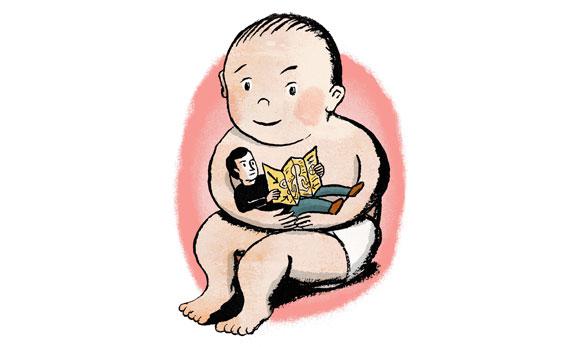When this blog launched last month, it sparked a minimeme on Twitter of #BabySlatePitches: The really, really counterintuitive guide to parenting. “Why you should shake your baby when it cries too much.” “Go ahead, touch the soft spot. It’s fine.”
Go ahead and laugh! The history of infancy is nothing but a very long, very sincere thread of #BabySlatePitches. For example: “Child sucking his thumb? Don’t let him bend his arm.” A century ago, as I write in Baby Meets World, well-meaning parents were so menaced by thumb-sucking that they strapped stiff splints around the elbows of their children. (They also pinned nightgowns to the mattress.)
But that’s too easy: Parents have been doing misguided things to their children since there were children. The most interesting #BabySlatePitches are the ones that are exonerated: the totally insane stuff that turns out to be surprisingly sensible.
“Give your baby a machete. It’s good practice.”
It’s the sort of sentence that stops you in your tracks: The Aka, a hunter-gatherer people in central Africa, teach “their eight-to- twelve-month-old infants how to use small pointed digging sticks, throw small spears, use miniature axes with sharp metal blades.”
This is not a hoax. It isn’t even that unusual. Once the infants of Fore people in New Guinea begin to walk, they are taught how to handle knives. Babies among the Efe, who live in the Congolese rainforest, are said to “routinely use machetes safely.”
None of these people share our foam-padded, toilet-locked lifestyle. Both the Aka and the Efe are subsistence societies. Survival is never a given. They teach their babies to use machetes in part because they need the help: Children are supposed to be useful from a shockingly young age. See this photo of an 11-month-old Efe infant carefully cutting a fruit in a half with a machete.
These machete-wielding babies do strikingly well: In the ethnographic record, there are no accounts of parents or siblings being hacked to pieces. Which is not to say that a machete is a good first birthday present for the hard-to-buy-for baby, even if he’s interested in cooking with Dad: For one thing, Babies R Us doesn’t carry any.
“Two enemas a day keep the doctor away.”
There’s pooping in the bath by accident and there’s pooping in the bath on purpose. And then there’s pooping in the bath because your parents made you do it: The Beng people of West Africa give their babies twice-daily enemas. Yes: enemas. Starting when the cord stump falls off.
This sounds like a truly disastrous idea. The Beng are chronically malnourished, and enemas are a good way to end up even more malnourished. (And they are excruciatingly painful for the baby.)
But enemas are not an optional part of Beng culture. They cannot be excised by a well-meaning NGO. Because Beng mothers go back to work in the fields a few months after birth, they depend on allomothers, often young girls, to watch their babies during the day. But no one wants to watch a child who’s going to defecate on you. (The Beng use no diapers at all. Plus, their taboo against excrement is even stronger than our own—it is considered morally dirty.) The enemas solve this problem: They make the baby regular. By the time a Beng mother returns to work, her baby, somewhat astonishingly, should only defecate during bathtime.
In a way, the whole structure of Beng life rotates around enemas: no enemas, no childcare, no mothers working, no farming. No Beng.
I’ll be posting some less justifiable #BabySlatePitches on Twitter today. Join in.
***
Nicholas Day’s book on the science and history of infancy, Baby Meets World, was just published. His website is nicholasday.net. He is @nicksday on Twitter.
